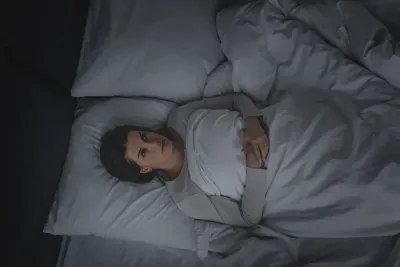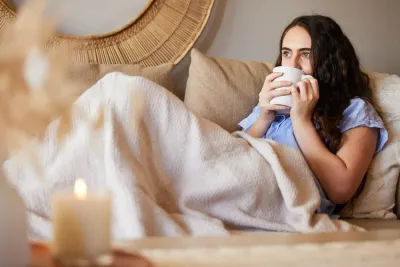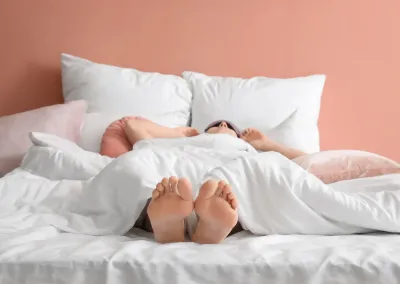
Key Takeaways
When sleep doesn’t come easily, how you respond can make a big difference in breaking the cycle of restlessness.
- If you can’t fall asleep after about 20 minutes, getting out of bed and doing something calming in low light can help prevent your brain from linking the bed with wakefulness.
- Quiet, screen-free activities like journaling, deep breathing, or reading can help shift your nervous system toward sleep.
- A bedroom that’s too warm is a common sleep disruptor, and cooling your sleep environment may help you fall asleep faster.
- Clock-watching can increase anxiety and make it harder to relax, so turning the clock away can help reduce mental pressure.
- Keeping a consistent sleep and wake routine—even after a rough night—supports better sleep quality over time.
Experiencing difficulty falling asleep can be frustrating and disorienting. Many people find themselves tossing and turning, wondering whether they should stay in bed or get up and do something else.
Understanding the best approach to take when you can’t sleep is crucial for both your mental and physical well-being. This blog explores the implications of sleeplessness, what happens to your body when you can’t sleep, and provides practical tips on whether to stay in bed or get up.
Less Tossing, More Snoozing—Let The Chilipad Do the Heavy Lifting
Tired of waking up hot and restless in the middle of the night? The Chilipad bed cooling system keeps your sleep environment at the perfect temperature—so you can fall asleep faster and stay asleep longer.
When You Should Get Out of Bed
Waking up in the middle of the night and having trouble falling asleep again is a common experience, and following certain guidelines can help you regain sleep.
If you find yourself awake in the middle of the night, unable to sleep, experts recommend getting out of bed after about 20-30 minutes of lying awake. [1] The main reason being that you don’t want your brain to start to associate being in bed with being awake. It’s all the opposite.
So, here are some suggestions to try:
Engage in Relaxing Activities
Once you decide to roll out of bed, which is a key step in what to do if you have trouble sleeping, engage in low-stimulation activities that promote relaxation. This could include:
- Reading a Book In a Comfortable Chair with Dim Light: Read a light and enjoyable book, avoiding anything too stimulating or engaging.
- Gentle Stretching or Yoga: Light stretching can help relax your body and mind.
- Meditation or Deep Breathing: Techniques such as controlled breathing or body scan meditation can help calm your mind.
- Progressive Muscle Relaxation: Systematically tensing and relaxing different muscle groups can help you recognize and release muscle tension, promoting overall relaxation and aiding sleep.
Avoid Bright Lights and Screens
When you climb out of bed, keep the lights dim and avoid screens to help with staying asleep. Bright lights and blue light from devices can signal your brain that it’s time to be awake, making it harder to fall back asleep.
Return to Bed Only When You Feel Sleepy
Only return to bed when you feel sleepy. This helps reinforce the association between your bed and sleep, rather than wakefulness. If you find yourself still awake after another 20-30 minutes, consider repeating the process to help achieve a good night's sleep.
When You Should Stay in Bed
While getting out of bed is often recommended, there are times when staying in bed may be appropriate, especially if you are experiencing trouble sleeping:
If You Feel Relaxed
If you are lying in bed and feel relaxed, it may be beneficial to stay there. Even if you are not asleep, allowing your body to rest can still provide some restorative benefits. This might be a great opportunity to try PMR (Progressive Muscle Relaxation), Cognitive Shuffling, or Yoga Nidra for sleep.
Avoiding Anxiety About Sleep
For some, the anxiety of getting out of bed can exacerbate the problem. If you find that getting up increases your stress about sleeping, staying in bed and practicing relaxation techniques may help you sleep better.
What Happens to Your Body When You Can't Sleep?
Sleep is a vital component of overall health; when you can’t sleep, your body undergoes several changes. Treating insomnia is crucial to mitigate these effects. Below are some of the physiological effects of sleep deprivation:
Cognitive Impairment
Lack of sleep can lead to difficulty concentrating, memory issues, and impaired decision-making. Studies show that sleep deprivation can affect cognitive performance as much as alcohol intoxication.
Mood Changes
Insufficient sleep can lead to irritability, anxiety, and increased stress levels. Chronic sleep deprivation is linked to mood disorders such as depression.
Related Blog: Understanding the Common Sleep Disorders
Physical Health Risks
Prolonged sleeplessness can increase the risk of various health issues, including obesity, diabetes, and cardiovascular diseases. The body’s ability to regulate hormones and metabolism is significantly affected by sleep.
Weakened Immune System
Sleep is essential for a healthy immune response. Lack of sleep can weaken your immune system, making you more susceptible to infections. Understanding these effects highlights the importance of addressing sleeplessness promptly and effectively.
Tips on How to Improve Your Sleep Hygiene
Improving your overall sleep hygiene can help reduce the frequency of sleepless nights. Here are some tips to consider:
Maintain a Consistent Sleep Schedule
Go to bed and wake up at the same time every day, even on weekends. This helps regulate your body's internal clock.
Create a Relaxing Bedtime Routine
Engage in calming activities before bed, such as reading, taking a warm bath, or practicing relaxation exercises.
Optimize Your Sleep Environment
Make sure your bedroom is conducive to quality sleep. This includes a comfortable mattress, a cool room temperature, and minimal noise and light.
Limit Stimulants
Avoid drinks, caffeine and nicotine in the hours leading up to bedtime, as these can interfere with your ability to fall asleep.
Tip: Caffeine can stay in your body up to 8 hours after consumption.
Get Regular Exercise
Regular physical activity can help you fall asleep faster and enjoy deeper sleep. However, avoid vigorous exercise close to bedtime.

When to Speak to Your Doctor
If sleeplessness becomes a persistent issue, it may be time to consult a sleep specialist or healthcare provider. Here are some signs that indicate you should seek professional help:
Chronic Insomnia
If you experience difficulty sleeping at least three times a week for three months or longer, it may be a sign of chronic insomnia.
Daytime Impairment
If your inability to sleep affects your daily life, such as causing fatigue, mood changes, or difficulty concentrating, it’s important to seek help.
Underlying Health Conditions
If you suspect that your sleep issues may be related to an underlying health condition, such as anxiety, depression, or sleep apnea, a doctor can provide a proper diagnosis and treatment plan.
Ineffective Self-Help Strategies
A healthcare provider can offer tailored advice and potential treatments if you have tried various self-help strategies without success.
Impact of Prescription Drugs
If you are taking prescription drugs, including antidepressants or other medications, and suspect they may be interfering with your sleep, consult your doctor to discuss potential alternatives or adjustments.
Enhance Your Sleep with the Chilipad
For those struggling with sleep, the Chilipad Dock Pro, the best cooling mattress topper, and Cube bed cooling systems offer a revolutionary solution among sleep aids.
This innovative sleep system allows you to control the temperature of your bed, creating an optimal sleep environment tailored to your preferences. Our bed cooling systems can help you fall asleep faster and stay asleep longer by maintaining a comfortable temperature throughout the night.
Imagine drifting off to sleep in a perfectly cooled bed, free from the discomfort of overheating. Sleeping hot is the worst! The Chilipad not only enhances your sleep quality but also promotes better overall health by supporting your body’s natural sleep cycles.
Final Thought
Deciding whether to stay up or climb out of bed when you can't sleep can significantly impact your overall sleep quality and mental well-being. By understanding the physiological effects of sleeplessness and following practical tips, you can create a more conducive environment for sleep.
Remember, if sleeplessness becomes a chronic issue, consulting a healthcare provider may be necessary to explore underlying causes and potential treatments.
Frequently Asked Questions
What Should I Avoid Doing When I Can’t Fall Back Asleep?
Avoid doom-scrolling, checking emails, or glaring at the ceiling like it owes you answers. Bright screens and mental stimulation can tank your melatonin levels.
What Are Some Proven Tips to Help Fall Back Asleep Quickly?
Try these science-backed strategies to ease your way back to dreamland:
- Practice slow, deep breathing (try 4-7-8 breathing)
- Do a body scan or mindfulness exercise
- Listen to calming music or a sleep-focused podcast
- Get out of bed and stretch in low lighting
- Avoid checking the time—it just builds stress
Can Scrolling Social Media Help Distract Me Back to Sleep?
Tempting, but nope. Blue light exposure tells your brain it’s party time, not bedtime. Social media is more likely to rev you up than wind you down.
What should I do if I cannot fall asleep after 20 to 30 minutes?
If you are unable to fall asleep within 20 to 30 minutes, it is recommended to get out of bed and engage in a calm, low-stimulation activity in dim lighting. This helps prevent the bed from becoming associated with wakefulness and supports healthier sleep onset.
Why does trying harder to sleep make insomnia worse?
Actively trying to force sleep can increase cognitive arousal and anxiety, which interferes with the natural sleep drive. This pattern is common in insomnia and is why behavioral approaches focus on reducing effort and pressure around sleep.
Peer-Reviewed Research References
-
Johns Hopkins Medicine.
Up in the Middle of the Night? How to Get Back to Sleep.
Johns Hopkins Medicine.
Source Type: Academic Medical Guidance
Key Insight: Provides evidence-based recommendations for managing middle-of-the-night awakenings, including relaxation techniques, sleep environment optimization, and strategies to prevent conditioned arousal.
View Resource
Source URL: https://www.hopkinsmedicine.org/health/wellness-and-prevention/up-in-the-middle-of-the-night-how-to-get-back-to-sleep









